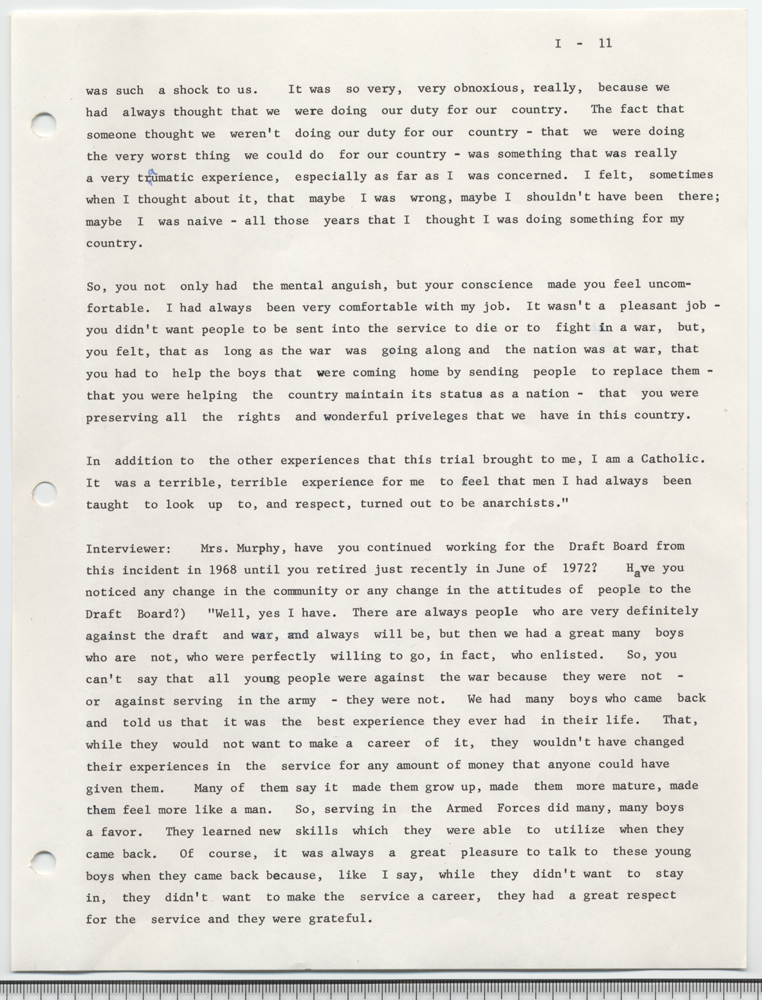 |
Burning of draft board records by Philip and Daniel Berrigan and others, May 17, 1968: an interview with Mary E. Murphy given on November 2, 1972
 |
13 / 15 |
 |



| Collection: |
Friends of Catonsville Library |
| Date: |
1972-11-02 |
| Date of Digitization: |
2004-03-29 |
| Source: |
Catonsville Library |
| Original Dimensions: |
28 x 22 cm |
| Creator: |
Murphy, Mary E. |
|
|
Notes:
This a transcript of a recorded interview with Mrs. Mary E. Murphy who was the Chief Clerk at the Draft Board office no. 33 at the time of the event of the forceful removing and burning of the draft cards by the Catonsville Nine group.
Transcription: was such a shock to us. It was so very,very obnoxious, really, because we
had always thought that we were doing our duty for our country. The fact that
someone thought we weren't doing our duty for our country - that we were doing
the very worst thing we could do for our country - was something that was really
a very traumatic experience, especially as far as I was concerned. I felt, sometimes
when I thought about it, that maybe I was wrong, maybe I shouldn't have been there;
maybe I was naive - all those years that I thought I was doing something for my
country.
So, you not only had the mental anguish, but your conscience made you feel uncom-
fortable. I had always been very comfortable with my job. It wasn't a pleasant job -
you didn't want people to be sent into the service to die or to fight in a war, but,
you felt, that as long as the war was going along and the nation was at war, that
you had to help the boys that were coming home by sending people to replace them
that you were helping the country maintain its status as a nation - that you were
preserving all the rights and wonderful priveleges that we have in this country.
In addition to the other experiences that this trial brought to me, I am a Catholic.
It was a terrible, terrible experience for me to feel that men I had always been
taught to look up to, and respect, turned out to be anarchists."
Interviewer: Mrs. Murphy, have you continued working for the Draft Board from
this incident in 1968 until you retired just recently in June of 1972? Have you
noticed any change in the community or any change in the attitudes of people to the
Draft Board?) "Well, yes I have. There are always people who are very definitely
against the draft and war, and always will be, but then we had a great many boys
who are not, who were perfectly willing to go, in fact, who enlisted. So, you
can't say that all young people were against the war because they were not
or against serving in the army - they were not. We had many boys who came back
and told us that it was the best experience they ever had in their life. That,
while they would not want to make a career of it, they wouldn't have changed
their experiences in the service for any amount of money that anyone could have
given them. Many of them say it made them grow up, made them more mature, made
them feel more like a man. So, serving in the Armed Forces did many, many boys
a favor. They learned new skills which they were able to utilize when they
came back. Of course, it was always a great pleasure to talk to these young
boys when they came back because, like I say, while they didn't want to stay
in, they didn't want to make the service a career, they had a great respect
for the service and they were grateful.
|




